Seleucus may refer to:
Seleucus may refer to:

Alexander I Theopator Euergetes, surnamed Balas, was the ruler of the Seleucid Empire from 150/Summer 152 – August 145 BC. Picked from obscurity and supported by the neighboring Roman-allied Kingdom of Pergamon, Alexander landed in Phoenicia in 152 BC and started a civil war against Seleucid King Demetrius I Soter. Backed by mercenaries and factions of the Seleucid Empire unhappy with the existing government, he defeated Demetrius and took the crown in 150 BC. He married the princess Cleopatra Thea to seal an alliance with the neighboring Ptolemaic kingdom. His reign saw the steady retreat of the Seleucid Empire's eastern border, with important eastern satrapies such as Media being lost to the nascent Parthian Empire. In 147 BC, Demetrius II Nicator, the young son of Demetrius I, began a campaign to overthrow Balas, and civil war resumed. Alexander's ally, Ptolemaic king Ptolemy VI Philometor, moved troops into Coele-Syria to support Alexander, but then switched sides and threw his support behind Demetrius II. At the Battle of the Oenoparus River in Syria, he was defeated by Ptolemy VI and he died shortly afterward.

The Seleucid Empire was a Greek state in West Asia that existed during the Hellenistic period from 312 BC to 63 BC. The Seleucid Empire was founded by the Macedonian general Seleucus I Nicator, following the division of the Macedonian Empire originally founded by Alexander the Great.
Antiochus is a Greek male first name, which was a dynastic name for rulers of the Seleucid Empire and the Kingdom of Commagene. In Jewish historical memory, connected with the Maccabean Revolt and the holiday of Hanukkah, "Antiochus" refers specifically to Antiochus IV Epiphanes.
Laodice may refer to:
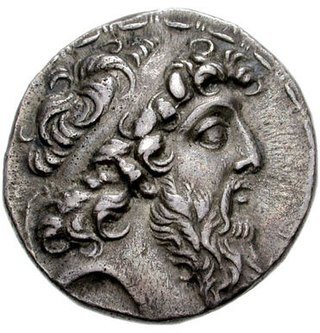
Demetrius II, called Nicator, was one of the sons of Demetrius I Soter. His mother may have been Laodice V, as was the case with his brother Antiochus VII Sidetes. Demetrius ruled the Seleucid Empire for two periods, separated by a number of years of captivity in Hyrcania in Parthia, first from September 145 BC to July/August 138 BC, and again from 129 BC until his death in 125 BC. His brother Antiochus VII ruled the Seleucid Empire in the interim between his two reigns.

Demetrius III Theos Philopator Soter Philometor Euergetes Callinicus was a Hellenistic Seleucid monarch who reigned as the King of Syria between 96 and 87 BC. He was a son of Antiochus VIII and, most likely, his Egyptian wife Tryphaena. Demetrius III's early life was spent in a period of civil war between his father and his uncle Antiochus IX, which ended with the assassination of Antiochus VIII in 96 BC. After the death of their father, Demetrius III took control of Damascus while his brother Seleucus VI prepared for war against Antiochus IX, who occupied the Syrian capital Antioch.

Antiochus I Soter was a Greek king of the Seleucid Empire. Antiochus succeeded his father Seleucus I Nicator in 281 BC and reigned during a period of instability which he mostly overcame until his death on 2 June 261 BC. He is the last known ruler to be attributed the ancient Mesopotamian title King of the Universe.

Seleucus I Nicator was a Macedonian Greek general, officer and successor of Alexander the Great. While serving under Alexander, Seleucus was commander of the Hypaspistia, or Silver-Shields, an elite Macedonian infantry unit, and eventually went on to become the founder and total ruler of the eponymous Seleucid Empire. In the power struggles that followed Alexander's death, Seleucus rose from being a secondary player to becoming total ruler of Asia Minor, Syria, Mesopotamia, and the Iranian Plateau, eventually assuming the title of basileus (king). The state he established on these territories, the Seleucid Empire, was one of the major powers of the Hellenistic world, until being overcome by the Roman Republic and Parthian Empire in the late second and early first centuries BC.
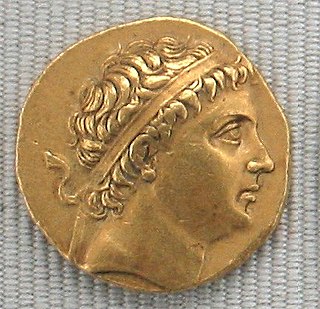
Diodotus I Soter, was the first Hellenistic King of Bactria. Diodotus became independent of the Seleucid empire around 255 or 245 BC, and established the Diodotid Bactrian Kingdom, which endured in various forms until the beginning of the first century AD. In about 250 BC, Diodotus repelled a Parthian invasion of Bactria by Arsaces. He also minted an extensive coinage and administered a powerful and prosperous new kingdom. He died around 235 BC and was succeeded by his son, Diodotus II.
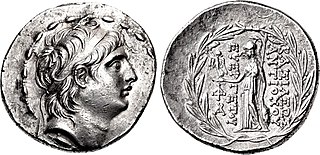
Antiochus VII Euergetes, nicknamed Sidetes, also known as Antiochus the Pious, was ruler of the Hellenistic Seleucid Empire from July/August 138 to 129 BC. He was the last Seleucid king of any stature. After Antiochus was killed in battle, the Seleucid realm was restricted to Syria.

Cleopatra Thea surnamed Eueteria was the ruler of the Hellenistic Seleucid Empire. She was queen consort of Syria from 150 to about 125 BC as the wife of three Syrian kings: Alexander Balas, Demetrius II Nicator, and Antiochus VII Sidetes. She ruled Syria from 125 BC after the death of Demetrius II Nicator, eventually in co-regency with her son Antiochus VIII Grypus until 121 or 120 BC.

Seleucus VI Epiphanes Nicator was a Hellenistic Seleucid monarch who ruled Syria between 96 and 94 BC. He was the son of Antiochus VIII and his Ptolemaic Egyptian wife Tryphaena. Seleucus VI lived during a period of civil war between his father and his uncle Antiochus IX, which ended in 96 BC when Antiochus VIII was assassinated. Antiochus IX then occupied the capital Antioch while Seleucus VI established his power-base in western Cilicia and himself prepared for war. In 95 BC, Antiochus IX marched against his nephew, but lost the battle and was killed. Seleucus VI became the master of the capital but had to share Syria with his brother Demetrius III, based in Damascus, and his cousin, Antiochus IX's son Antiochus X.
The Seleucid king Seleucus V Philometor, ruler of the Hellenistic Seleucid kingdom, was the eldest son of Demetrius II Nicator and Cleopatra Thea. The epithet Philometor means "mother-loving" and in the Hellenistic world usually indicated that the mother acted as co-regent for the prince.

The Syrian Wars were a series of six wars between the Seleucid Empire and the Ptolemaic Kingdom of Egypt, successor states to Alexander the Great's empire, during the 3rd and 2nd centuries BC over the region then called Coele-Syria, one of the few avenues into Egypt. These conflicts drained the material and manpower of both parties and led to their eventual destruction and conquest by Rome and Parthia. They are briefly mentioned in the biblical Books of the Maccabees.
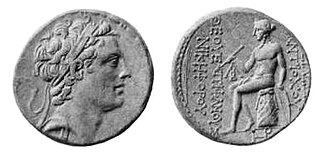
The coinage of the Seleucid Empire is based on the coins of Alexander the Great, which in turn were based on Athenian coinage of the Attic weight. Many mints and different issues are defined, with mainly base and silver coinage being in abundance. A large concentration of mints existed in the Seleucid Syria, as the Mediterranean parts of the empire were more reliant on coinage in economic function.

The Seleucid–Parthian wars were a series of conflicts between the Seleucid Empire and Parthia which resulted in the ultimate expulsion of the Seleucids from Iran and the establishment of the Parthian Empire. The wars were caused by Iranian tribes migrating into Central Asia and the inability of the Seleucids to properly defend or hold together their vast empire.

Laodice V was a Seleucid princess. Through marriage to Perseus king of Macedon she was a Queen of the ruling Antigonid dynasty in Macedonia and possibly later of the Seleucid dynasty.
Alexander was a Greek nobleman of Anatolia and served as a Seleucid official.
Philopator, meaning "father-loving", was a common royal epithet among Hellenistic monarchs:
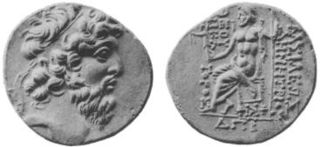
The Seleucid Dynastic Wars were a series of wars of succession that were fought between competing branches of the Seleucid royal household for control of the Seleucid Empire. Beginning as a by-product of several succession crises that arose from the reigns of Seleucus IV Philopator and his brother Antiochus IV Epiphanes in the 170s and 160s, the wars typified the final years of the empire and were an important cause of its decline as a major power in the Near East and Hellenistic world. The last war ended with the collapse of the kingdom and its annexation by the Roman Republic in 63 BC.